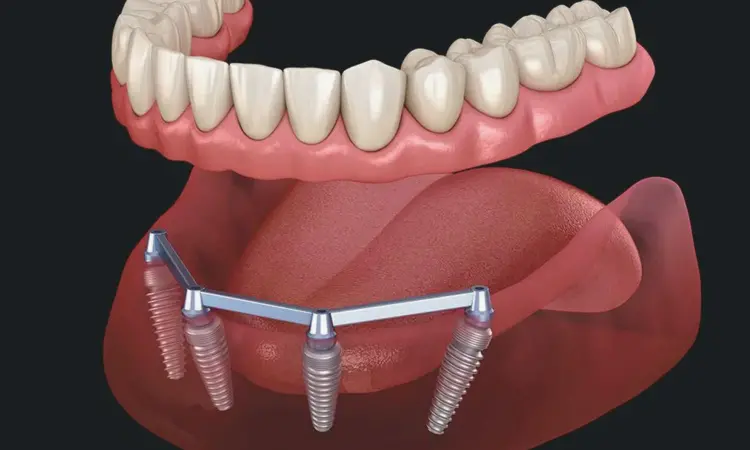- Home
- Medical news & Guidelines
- Anesthesiology
- Cardiology and CTVS
- Critical Care
- Dentistry
- Dermatology
- Diabetes and Endocrinology
- ENT
- Gastroenterology
- Medicine
- Nephrology
- Neurology
- Obstretics-Gynaecology
- Oncology
- Ophthalmology
- Orthopaedics
- Pediatrics-Neonatology
- Psychiatry
- Pulmonology
- Radiology
- Surgery
- Urology
- Laboratory Medicine
- Diet
- Nursing
- Paramedical
- Physiotherapy
- Health news
- Fact Check
- Bone Health Fact Check
- Brain Health Fact Check
- Cancer Related Fact Check
- Child Care Fact Check
- Dental and oral health fact check
- Diabetes and metabolic health fact check
- Diet and Nutrition Fact Check
- Eye and ENT Care Fact Check
- Fitness fact check
- Gut health fact check
- Heart health fact check
- Kidney health fact check
- Medical education fact check
- Men's health fact check
- Respiratory fact check
- Skin and hair care fact check
- Vaccine and Immunization fact check
- Women's health fact check
- AYUSH
- State News
- Andaman and Nicobar Islands
- Andhra Pradesh
- Arunachal Pradesh
- Assam
- Bihar
- Chandigarh
- Chattisgarh
- Dadra and Nagar Haveli
- Daman and Diu
- Delhi
- Goa
- Gujarat
- Haryana
- Himachal Pradesh
- Jammu & Kashmir
- Jharkhand
- Karnataka
- Kerala
- Ladakh
- Lakshadweep
- Madhya Pradesh
- Maharashtra
- Manipur
- Meghalaya
- Mizoram
- Nagaland
- Odisha
- Puducherry
- Punjab
- Rajasthan
- Sikkim
- Tamil Nadu
- Telangana
- Tripura
- Uttar Pradesh
- Uttrakhand
- West Bengal
- Medical Education
- Industry
Immediate versus Non-Immediate Loading: Study Finds Comparable Success in Overdenture Implant Treatments

China: A recent systematic review and meta-analysis comparing immediate versus non-immediate loading (NIL) protocols for reduced-diameter implants supporting overdentures has revealed promising findings for both treatment approaches.
The study, published in The International Journal of Oral & Maxillofacial Implants, concluded that immediate loading (IL) protocols can achieve comparable survival rates and marginal bone loss (MBL) outcomes compared to non-immediate loading protocols. The researchers noted that these results could have significant implications for planning and managing dental implants, particularly in cases requiring reduced-diameter implants for overdenture support.
Implantology has seen significant advancements in recent years, and loading protocols are an essential factor in the success of implant-supported overdentures. The primary difference between immediate loading and non-immediate loading lies in the timing of the prosthesis placement. In immediate loading, the overdenture is placed on the implants right after insertion, while in non-immediate loading, the prosthesis is applied after a healing period of several months. Both approaches have been used in clinical practice, with each having its advantages and challenges. However, the optimal protocol for reduced-diameter implants, which are often used in patients with limited bone availability, has been a topic of ongoing research.
Against the above background, researchers from China, led by Ying Liu, aimed to evaluate the impact of immediate loading versus non-immediate loading protocols on overdentures supported by reduced-diameter implants (≤ 3.5 mm).
For this purpose, the researchers conducted a comprehensive search of electronic databases, including MEDLINE (via PubMed), Embase, and the Cochrane Central Register of Controlled Trials, to identify randomized controlled trials (RCTs) comparing the clinical outcomes of immediately loaded and non-immediately loaded reduced-diameter implants supporting overdentures. The risk of bias within and across the studies was assessed using RoB 2.0, while the certainty of evidence was evaluated using the GRADE system.
A sensitivity analysis was performed by excluding studies at high risk of bias and repeating the data synthesis using the random effects model. Additionally, subgroup analyses were carried out based on implant diameter and follow-up duration.
The following were the key findings of the study:
- Six RCTs with 255 patients were included in the systematic review.
- Meta-analyses found similar implant survival rates between immediately loaded (IL) and non-immediately loaded (NIL) implants in the mini-implant subgroup (RR = 0.98) and narrow-diameter implant subgroup (RR = 0.99).
- No significant difference in implant survival rates was observed in short-term (RR = 0.98) and long-term (RR = 0.97) follow-up subgroups.
- Marginal bone loss showed no statistically significant difference between loading protocols in long-term follow-up (MD = 0.03).
- Three RCTs investigating peri-implant parameters revealed relatively higher modified plaque index (PI) and probing depth (PD) in reduced-diameter implants under IL.
"The IL protocol, when compared to NIL, yields comparable survival rates and marginal bone loss (MBL) in reduced-diameter implants supporting overdentures," the researchers concluded.
Reference:
Liu Y, He F, Zhao Y, Sun Q, Xia H, Xia D, Bai Y. Immediate Versus Non-immediate Loading Protocols for Reduced-Diameter Implants Supporting Overdentures: A Systematic Review and Meta-analysis. Int J Oral Maxillofac Implants. 2024 Oct 16;39(5):657-664. doi: 10.11607/jomi.10625. PMID: 38498788.
Dr Kamal Kant Kohli-MBBS, DTCD- a chest specialist with more than 30 years of practice and a flair for writing clinical articles, Dr Kamal Kant Kohli joined Medical Dialogues as a Chief Editor of Medical News. Besides writing articles, as an editor, he proofreads and verifies all the medical content published on Medical Dialogues including those coming from journals, studies,medical conferences,guidelines etc. Email: drkohli@medicaldialogues.in. Contact no. 011-43720751


